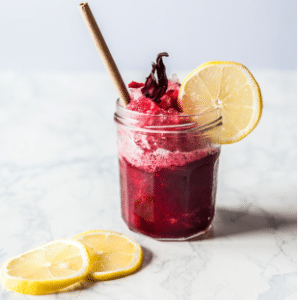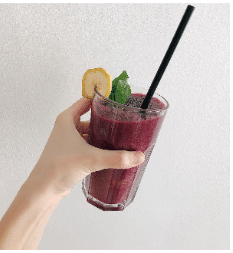Introduction
Kanji is a probiotic beverage popular in Northern India. Although it can be compared to Kombucha, the technique of manufacturing kanji is somewhat different.
It is excellent for the gut and promotes digestion because it is a probiotic drink. This drink has a dark purple colour and is traditionally made with black carrots. Because I can’t get black carrots, I substitute red carrots in this healthful drink.
About
Kanji (Kanji Drink) is a traditional probiotic drink from north India created by fermenting carrots in water with spices. It takes less than 15 minutes to put together.
Kanji Drink is a traditional fermented North Indian drink made primarily in the winter. It has a distinct colour and flavour, as well as a distinct preparation method: it is fermented for 2-5 days.
Pickles, dosa and idli, yoghurt, and other fermented foods are common in India, and this Kanji drink recipe is a terrific addition to the list.
Maroon colourede juice with a straw
Kanji Juice
Ground mustard seeds, red chilli powder, and black salt (or salt) are used to season the kanji. The carrots, spices, and seasonings are combined with some boiled, cooled water and fermented for several days.
A glass or ceramic jar holds the complete drink, including its ingredients. The drink is allowed to ferment for 2 to 3 to 4 days in these jars, which are placed in the sun.
It is contingent on how the sun is behaving in your area. As a result, if there isn’t enough sunshine, the drink can be preserved for 4 to 5 days. If the weather is hot or really hot, the drink will spontaneously ferment in 1 to 2 to 3 days.
During the cold winters of North India, the mustard in the kanji drink keeps the body warm. The fermentation process alters the drink’s flavour and adds probiotics to it. The flavour is mildly sweet and sour, with a distinct fermented beverage fragrance.
As an aperitif, Kanji is offered. It has a strong, sour, spicy flavour. Enjoy Kombucha, this is a taste that you either like or don’t like.
Hand holding glass of juice
How to Make Kanji Juice in Step-by-Step Order
- Rinse, peel, and chop the carrots into 1.5 to 2 inch long batons or sticks, as seen in the photo. Peel the beets and cut them into wedges or sticks that are 1.5 to 2 inches long.
If you don’t have red carrots on hand, orange carrots can be substituted. If you don’t like beets, substitute 1 more medium-sized carrot in their place.
- 2 tbsp yellow mustard, finely ground in a dry grinder Use 1 tablespoon if you’re using black or brown mustard.
Water must first be brought to a boil. Before eating, let it cool to room temperature. Add the carrots, beets, ground yellow mustard powder, black or ordinary salt, and red chilli powder to a clean and dry ceramic or glass container with a wide opening.
- Fill the jars with boiling, cooled water. Filter the water with a fine mesh sieve before pouring it into the container if you wish.
- Use a clean, dry spoon to thoroughly stir this mixture.
- Secure and knot a muslin/cheese cloth around the mouth of the jars or bottles with a loose lid. Allow the jars or bottles to be exposed to light.
Allow 2 to 3 days for the drink to ferment until it is sour. Make sure the drink doesn’t overferment.
The next day, before placing it in the sun, stir the mixture with a clean wooden spoon. Instead of stirring with a spoon, you may shake the jar.
- The carrot kanji is ready when the liquid starts to taste sour. Refrigerate or serve immediately the kanji drink.
While serving, throw in a couple of ice cubes. I prefer cold kanji, so I put it in the fridge for a couple of hours. Kanji will last 4 to 5 days in the refrigerator. Before meals or throughout the day, drink the kanji. With any Indian main meal, serve the fermented carrot and beetsticks as a pickle. Salads, wraps, burgers, and sandwiches can all benefit from the sour-tangy carrots and beets.
Orange Coloured Liquid in a glass jar
Conclusion
Nutritionists and health professionals frequently emphasise the importance of adjusting our diets according to the season to maintain a healthy lifestyle. And by modifying, we mean including seasonal fruits and vegetables rich in various vital components in the diet. In addition, we receive a variety of desi ‘nuskas,’ which aid in the treatment of a variety of seasonal illnesses. Kanji is a perfect example. For those who are unfamiliar with kanji, it is a fermented beverage with a pungent, zingy flavour. It’s traditionally made from leftover vegetables, and it’s a great example of Indian zero-waste cuisine. Apart from its long history, kanji is also known for its health benefits.
31.05.2022





